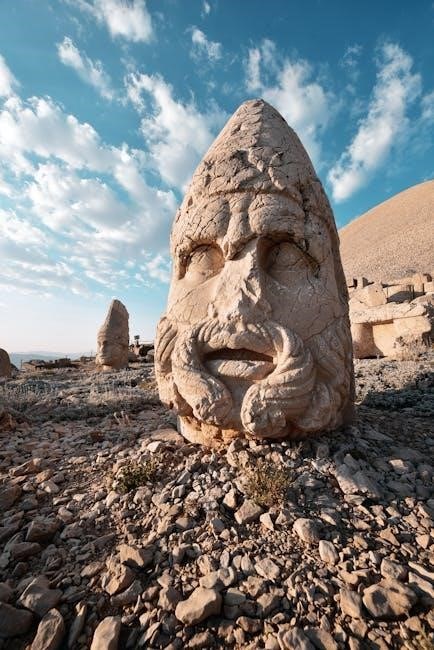c++ primer pdf
C++ Primer PDF: A Comprehensive Article Plan
Exploring C++ Primer PDFs reveals resources like Stephen Prata’s editions and Lippman’s work, accessible via GitHub, Internet Archive, and Scribd, aiding computer science learning.
The C++ Primer stands as a cornerstone resource for both novice and experienced programmers seeking mastery of the C++ language. Numerous editions exist, notably Stephen Prata’s “C Primer Plus” (4th and 6th editions) and Lippman, Lajoie, and Moo’s “C++ Primer” (5th edition), each offering a comprehensive exploration of C++ concepts.
These primers aren’t merely textbooks; they are guides to understanding the intricacies of the language, from fundamental data types and control flow to advanced object-oriented programming techniques. Accessing these resources in PDF format facilitates convenient study and portability, with options available through legitimate sources like GitHub and the Internet Archive, though caution is advised against unofficial download sites.
Understanding Different Editions of the C++ Primer

Several editions of C++ primers cater to varying learning needs. Stephen Prata’s “C Primer Plus” evolved from a 4th to a 6th edition, continually updating to reflect ANSI C standards and modern programming practices. The 5th edition of “C++ Primer” by Lippman, Lajoie, and Moo, focuses specifically on C++, offering in-depth coverage of object-oriented principles.
PDF versions of these texts are widely sought for accessibility. Resources like the Internet Archive and GitHub host these files, while Scribd provides access through its digital library. Understanding the edition’s publication date is crucial, as newer editions incorporate the latest C++ standards and best practices.
C Primer Plus (4th Edition) ⎯ Stephen Prata
Stephen Prata’s “C Primer Plus” (4th Edition) serves as a foundational text for learning the ANSI C standard. This edition comprehensively covers essential programming concepts, including control flow statements like loops and conditionals, and the fundamentals of functions. It also introduces object-oriented programming techniques, providing a stepping stone for those transitioning to C++.
PDF versions are available through platforms like Scribd and the Internet Archive, offering convenient access for students and self-learners. This edition is particularly relevant within courses like CSCI0330 Intro Computer Systems, providing a solid base for understanding computer systems programming.
C Primer Plus (6th Edition) ー Stephen Prata
Stephen Prata’s “C Primer Plus” (6th Edition) represents an updated and refined approach to mastering the C programming language. This edition builds upon the strengths of previous versions, offering a thorough exploration of C’s features and capabilities. Accessible PDF copies can be found on platforms like the Internet Archive and GitHub repositories, facilitating convenient study and practice.
The 6th edition continues to emphasize practical application, guiding learners through essential concepts with clear explanations and illustrative examples. It remains a valuable resource for both introductory courses and self-directed learning, providing a strong foundation for further exploration of computer science principles.

C++ Primer (5th Edition) ー Lippman, Lajoie, Moo
Lippman, Lajoie, and Moo’s “C++ Primer” (5th Edition) is a cornerstone text for learning modern C++. This comprehensive guide delves into the intricacies of the language, covering everything from fundamental concepts to advanced techniques. PDF versions are discoverable through resources like GitHub, specifically within repositories such as cpp-playground, offering students and developers convenient access.
The book’s strength lies in its detailed explanations and practical examples, making complex topics approachable. It’s a favored resource in computer science curricula, providing a solid base for object-oriented programming and systems development. Its continued relevance ensures its value for both beginners and experienced programmers.
Why Use a C++ Primer?
A C++ Primer is invaluable for mastering the language due to its thorough coverage of core concepts and modern features. Whether you’re a student tackling CSCI0330 Intro Computer Systems or a self-learner, these primers provide a structured learning path. Accessible PDF versions, found on platforms like the Internet Archive and Scribd, offer convenient study options.
These resources bridge the gap between theory and practice, equipping you with the skills to write efficient and robust C++ code. Utilizing a primer ensures a strong foundation, crucial for tackling complex projects and staying current with industry standards. They are essential for both academic and professional growth.
Key Concepts Covered in the C++ Primer
C++ Primers comprehensively cover fundamental programming elements, starting with data types and operators. They delve into control flow statements – loops and conditionals – essential for program logic. A core focus is on functions, including the powerful technique of function overloading, enhancing code reusability.
Beyond the basics, these primers lay the groundwork for object-oriented programming (OOP). Expect detailed explanations of classes, objects, inheritance, polymorphism, encapsulation, and abstraction. Resources like Stephen Prata’s editions, available as PDFs, systematically build your understanding of these vital concepts, preparing you for advanced C++ development.

Fundamental Data Types and Operators
C++ Primers meticulously explain fundamental data types – integers, floating-point numbers, characters, and booleans – forming the building blocks of any C++ program. They detail how these types are declared, initialized, and manipulated. A significant portion is dedicated to operators: arithmetic, relational, logical, bitwise, and assignment, demonstrating their precedence and usage.
Resources like the C Primer Plus editions, often found as PDFs, provide numerous examples illustrating how these elements interact. Understanding these fundamentals, as presented in these primers, is crucial before progressing to more complex concepts like control flow or object-oriented programming.
Control Flow Statements (Loops, Conditionals)
C++ Primer PDFs thoroughly cover control flow mechanisms essential for directing program execution. This includes conditional statements – if, else if, and else – enabling decisions based on conditions. Equally important are loops – for, while, and do-while – facilitating repetitive tasks. These primers demonstrate how to effectively utilize these structures to create dynamic and responsive programs.
Resources like Stephen Prata’s editions, available in PDF format, provide practical examples and exercises. Mastering these concepts, as detailed in the C++ Primer, is fundamental for building any non-trivial application.
Functions and Function Overloading
C++ Primer PDFs dedicate significant attention to functions – reusable blocks of code performing specific tasks. They explain function definitions, parameters, return types, and the crucial concept of function calls. A key feature explored is function overloading, allowing multiple functions with the same name but differing parameters. This enhances code flexibility and readability.
Resources like the C++ Primer by Lippman, Lajoie, and Moo, in PDF format, provide detailed explanations and practical examples. Understanding functions and overloading, as presented in these primers, is vital for modular and efficient C++ programming.
Object-Oriented Programming (OOP) with C++
C++ Primer PDFs thoroughly cover Object-Oriented Programming (OOP) principles, a cornerstone of modern software development. These resources, including editions by Stephen Prata and Lippman et al., detail core concepts like classes and objects – blueprints and instances, respectively. They explain how OOP promotes code reusability and organization.
Further exploration includes inheritance, enabling creation of new classes from existing ones, and polymorphism, allowing objects of different classes to be treated uniformly. Accessing these concepts through a C++ Primer PDF is crucial for mastering C++’s powerful OOP capabilities.
Classes and Objects
C++ Primer PDFs dedicate significant attention to classes and objects, fundamental building blocks of object-oriented programming. These resources, like those authored by Stephen Prata, explain how classes serve as blueprints defining data (attributes) and actions (methods) that objects embody. Understanding class construction, member functions, and data encapsulation is paramount.
The PDFs illustrate object creation as instances of these classes, demonstrating how objects interact and manipulate data. Through practical examples, they solidify the concept of bundling data and functions, fostering a clear grasp of this core OOP principle within the C++ framework.
Inheritance and Polymorphism
C++ Primer PDFs thoroughly cover inheritance and polymorphism, cornerstones of object-oriented design. These resources, including editions by Lippman, Lajoie, and Moo, explain how inheritance enables creating new classes (derived classes) based on existing ones (base classes), promoting code reuse and establishing hierarchical relationships.
Polymorphism, demonstrated through virtual functions, allows objects of different classes to be treated as objects of a common type. The PDFs illustrate how this facilitates flexible and extensible code, crucial for complex systems. Practical examples within these primers solidify understanding of these powerful OOP concepts.
Encapsulation and Abstraction
C++ Primer PDFs dedicate significant attention to encapsulation and abstraction, fundamental principles of object-oriented programming. These resources, like those authored by Stephen Prata, explain how encapsulation bundles data and methods that operate on that data within a class, protecting internal state and controlling access.
Abstraction, conversely, presents only essential information to the user, hiding complex implementation details. The primers demonstrate how access specifiers (public, private, protected) enforce encapsulation and how abstract classes and interfaces achieve abstraction, leading to more maintainable and robust code. These concepts are vital for effective software design.
Accessing and Downloading C++ Primer PDFs
Locating C++ Primer PDFs involves navigating legitimate sources and understanding potential risks. Resources like the Internet Archive, GitHub repositories (e.g., yanshengjia/cpp-playground), and Scribd offer access to various editions, including those by Stephen Prata and Lippman, Lajoie, and Moo. However, caution is advised when downloading from unofficial sources due to potential malware or copyright infringements.
Always prioritize legal and ethical acquisition methods. Utilizing official publisher websites or authorized online bookstores ensures a safe and reliable download. Understanding Urn identifiers can help verify resource authenticity when exploring platforms like the Internet Archive.

Legitimate Sources for PDF Downloads
Reliable sources for obtaining C++ Primer PDFs include official publisher websites, authorized online bookstores, and educational platforms. The Internet Archive provides access to scanned copies, often with associated Urn identifiers for verification. GitHub repositories, like those maintained by developers (e.g., yanshengjia/cpp-playground, hmsjy2017/free-ebooks), sometimes host legally shared resources.
Scribd, while offering a vast library, requires subscriptions for full access. Prioritize sources that respect copyright laws and offer secure downloads to avoid potential malware risks. Always double-check the legitimacy of a source before downloading any PDF file.
Potential Risks of Downloading from Unofficial Sources
Downloading C++ Primer PDFs from unofficial websites carries significant risks. These sources often host malware, viruses, and other malicious software disguised as legitimate files. Compromised PDFs can steal personal information, damage your device, or enroll it in botnets. Copyright infringement is also a concern, as unauthorized distribution violates intellectual property rights.
Furthermore, unofficial PDFs may be outdated, incomplete, or contain errors, hindering your learning process. Prioritize legitimate sources to ensure a safe and reliable learning experience. Always use updated antivirus software and exercise caution when encountering free downloads.
C++ Primer as a Resource for Computer Science Courses
The C++ Primer serves as a foundational text in numerous computer science curricula, particularly introductory courses like CSCI0330. Its comprehensive coverage of C++ concepts, from fundamental data types to object-oriented programming, aligns with core course objectives. The book’s detailed explanations and practical examples facilitate student understanding and skill development.
Instructors often recommend the Primer as a primary resource, supplementing lectures with exercises and projects based on its content. Access to a PDF version enhances accessibility for students, enabling convenient study and reference. It’s a vital tool for mastering C++ principles.
Comparing C++ Primer with Other C++ Learning Resources

While numerous C++ learning resources exist, the C++ Primer distinguishes itself through its depth and breadth. Compared to quicker tutorials or online courses, it offers a more rigorous and complete foundation. Resources like cpp-playground provide interactive coding environments, complementing the Primer’s theoretical explanations.
C Primer Plus, another popular choice, focuses more on the C language aspects, while the C++ Primer dives deeper into object-oriented principles. Accessing a C++ Primer PDF allows for offline study, unlike many web-based resources. Ultimately, the best resource depends on individual learning style and goals.
Utilizing the C++ Primer for Self-Study
A C++ Primer PDF is ideal for self-directed learning, offering a structured curriculum. Begin with fundamental data types and control flow, progressively tackling object-oriented programming concepts. Supplement reading with practical coding exercises; cpp-playground provides a convenient platform.
Leverage the Internet Archive and Scribd for access, but be mindful of potential risks from unofficial sources. Consistent practice, alongside the Primer’s explanations, is crucial. Break down chapters into manageable sections, and don’t hesitate to revisit earlier material. A downloaded PDF enables focused, distraction-free study sessions.
C Primer Plus and ANSI C Standard
C Primer Plus, particularly the 4th and 6th editions by Stephen Prata, serves as a comprehensive guide to the ANSI C standard. These editions meticulously cover essential programming concepts, including loops, functions, and classes. The book’s strength lies in its detailed explanations and practical examples, making it suitable for both beginners and experienced programmers.
Accessing these resources as PDFs, through platforms like Scribd or the Internet Archive, facilitates convenient study. Understanding the ANSI C standard is foundational for grasping C++ concepts, as C++ builds upon C’s principles. The Primer’s focus on C fundamentals provides a solid base for further exploration.
The Role of the C++ Primer in CSCI0330 Intro Computer Systems
Within the CSCI0330 Intro Computer Systems course, utilizing resources like the C++ Primer – or its C counterpart, C Primer Plus – is crucial. Doeppner’s Fall 2019 syllabus highlights the necessity of a strong C foundation for the initial labs. The Primer provides that foundation, covering everything students need to know to successfully navigate the course’s early programming assignments.
Accessing a PDF version of the Primer allows students convenient offline study and reference. The book’s comprehensive coverage of C fundamentals, including loops and functions, directly aligns with the course’s introductory material, ensuring students are well-prepared for practical application.
GitHub Repositories Containing C++ Primer PDFs
GitHub serves as a valuable platform for locating C++ Primer PDFs, though legality should always be considered. The repository cpp-playground, maintained by yanshengjia, features a resource directory containing “C Primer (5th Edition).pdf”. This demonstrates a community effort to share learning materials.
However, users must exercise caution. While these repositories offer convenient access, verifying the source and respecting copyright restrictions is paramount. Exploring GitHub can uncover various editions, but responsible downloading and usage are essential for ethical learning practices. Always prioritize legitimate sources when possible.
Internet Archive Resources for C++ Primers
The Internet Archive provides a rich collection of C++ Primer resources, offering both borrowing and download options. Notably, Keith Weiskamp’s “The Complete C Primer” is available, identified by urn:oclc:record:1148603456. Stephen Prata’s “C Primer Plus” also appears, with urn:oclc:record:1029037852. Furthermore, a “C Primer 6th” edition is accessible.
The Archive’s strength lies in its preservation of older editions, potentially valuable for historical context. Users can access these materials freely, but should be mindful of any usage restrictions or copyright notices associated with each resource. It’s a fantastic digital library for C++ learning.

Scribd as a Source for C++ Primer PDFs
Scribd hosts digital versions of several C++ Primer editions, including Stephen Prata’s “C Primer Plus 4th ed” from 2024. This resource allows users to read the book online or download it as a PDF file, alongside text file options. Scribd operates on a subscription model, granting access to a vast library of documents, including programming textbooks.

While convenient, remember Scribd’s terms of service regarding downloads and usage. It’s crucial to respect copyright and utilize the material responsibly. Scribd can be a valuable supplement to traditional learning methods, offering quick access to C++ concepts.
Understanding the Urn Identifiers for C++ Primer Resources
Urn identifiers, like those found on the Internet Archive, are crucial for pinpointing specific versions of C++ Primer PDFs. These unique strings – such as urn:oclc:record:1148603456 for “The Complete C Primer” – act as persistent digital fingerprints. They differentiate between editions and formats (lcpdf, epub).
Understanding these identifiers aids in accurate referencing and locating resources. They ensure you’re accessing the intended C++ Primer version, whether it’s Prata’s “C Primer Plus” or another edition. These identifiers are vital for researchers and students seeking specific materials.

C++ Primer and Object-Oriented Programming Techniques
C++ Primer comprehensively covers object-oriented programming (OOP) techniques, a cornerstone of modern software development. Resources like Stephen Prata’s “C Primer Plus” delve into classes and objects, demonstrating how to model real-world entities. The Primer explains inheritance and polymorphism, enabling code reuse and flexibility.
Furthermore, it elucidates encapsulation and abstraction, vital for data protection and simplifying complex systems. Studying these concepts within the C++ Primer PDF equips learners with the skills to design robust, maintainable, and scalable applications, essential for advanced programming endeavors.
Navigating the C++ Primer PDF
Effectively navigating a C++ Primer PDF requires utilizing its features. Most PDFs offer a searchable table of contents, allowing quick access to specific topics. Hyperlinks within the document connect related concepts, streamlining learning.
Utilize bookmarking tools to save frequently referenced sections. Zoom functionality enhances readability, while annotation tools facilitate note-taking. Resources sourced from platforms like the Internet Archive or GitHub may require PDF reader software. Familiarizing yourself with these navigation techniques maximizes the learning experience from the C++ Primer PDF.
Troubleshooting Common Issues with C++ Primer PDFs
Encountering issues with C++ Primer PDFs is common. Corrupted downloads can result in unreadable files; re-downloading from a legitimate source often resolves this. Password-protected PDFs may require the correct password, potentially found with the download source.
Rendering problems, like distorted text, can be fixed by updating your PDF reader software. Large files may load slowly; ensure sufficient system resources. If hyperlinks are broken, the PDF might be incomplete. Always prioritize downloads from trusted sources to minimize these troubleshooting needs and ensure a smooth learning experience.
C++ Primer for Beginners: A Step-by-Step Approach
Starting with a C++ Primer PDF, begin with fundamental concepts like data types and control flow. Stephen Prata’s editions offer a structured learning path, ideal for newcomers. Practice each concept with small coding exercises. Focus on understanding functions and object-oriented principles gradually.
Utilize the PDF’s examples and work through them independently. Don’t hesitate to consult online resources or forums for clarification. Consistent practice and a methodical approach, guided by the Primer, are key to mastering C++ effectively, building a solid foundation for future learning.
Advanced Topics Covered in the C++ Primer
Delving into a C++ Primer PDF reveals advanced concepts beyond the basics. Expect in-depth coverage of templates, the Standard Template Library (STL), and exception handling. Explore advanced object-oriented techniques like multiple inheritance and virtual functions. The Primer guides you through memory management, including pointers and dynamic allocation.
Furthermore, it addresses complex topics like lambda expressions and concurrency. Utilizing the PDF’s detailed explanations and examples is crucial for grasping these sophisticated features. Mastering these advanced topics unlocks the full potential of C++ programming, enabling you to tackle complex software projects.

The Future of C++ and the Relevance of the Primer
C++ continues to evolve with ongoing standardization efforts, ensuring its relevance in modern software development. The C++ Primer PDF remains a cornerstone resource, providing a solid foundation for understanding these changes. New standards introduce features like modules and concepts, enhancing performance and code maintainability.
Despite the emergence of newer languages, C++’s efficiency and control make it vital in performance-critical applications. The Primer’s comprehensive approach equips developers to adapt to these advancements, ensuring long-term career viability. Accessing a C++ Primer PDF is therefore a strategic investment for any aspiring or current programmer.
The C++ Primer PDF serves as an invaluable tool for anyone embarking on a C++ learning journey. Whether utilizing Stephen Prata’s editions or Lippman’s comprehensive guide, the Primer provides a structured path to proficiency. Resources like GitHub and the Internet Archive offer convenient access to these essential materials.
From fundamental concepts to object-oriented programming, the Primer equips developers with the skills needed for success. Consistent study and practical application, guided by the PDF, unlock C++ mastery. It’s a foundational resource for both academic pursuits and professional development, ensuring a strong grasp of this powerful language.















































































